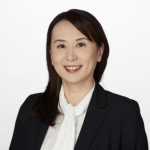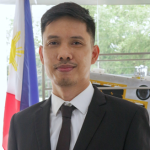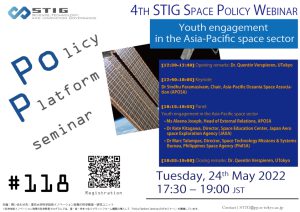【REPORT】To establish an effective space-based industry, capacity and capability must be built. The youth is the primary recipient for capacity-building activities to jump start the space industry. The Science, Technology and Innovation Governance (STIG) program held a webinar that talked about the importance of youth engagement and discussed its impact in the Asia-Pacific and Oceania space sector held on May 24, 2022.
First, Dr. Quentin Verspieren (The University of Tokyo) delivered opening remarks and introduced the STIG program and its activities. After that, he introduced the topic of youth engagement and talked briefly about the importance of the youth’s consciousness and knowledge about the space sector.
Following, Dr. Sindhu Paramasivam, the chairperson of the Asia-Pacific Oceania Space Association (APOSA), delivered the keynote speech. She talked about the APOSA; how it started, why it was formed, what are its activities, and how it engages with the youth. She emphasized the importance of the Oceanian community also which consists of the diverse Pacific Islands, alongside with the Asia-Pacific region.
After the keynote speech, the panelists consisted of Dr. Kate Kitagawa (Director, Space Education Center, JAXA), Ms. Aleena Joseph (Head of External Relations, APOSA), and Dr. Marc Talampas (Director, Space Technology Missions & Systems Bureau, PhilSA) discussed how the youth in the Asia-Pacific can be engaged and why it is important for the region. In addition, the importance of NGOs as the center of igniting the youth’s interest is emphasized. It is important that the government and NGOs cooperate with each other to increase space technology awareness.
Finally, after the discussion, the panelists along with Dr. Verspieren and Dr. Paramasivam answered questions from the audience.
Visit our STIG You Tube channel
【Webinar overview】
Date & Time:
Tuesday 24 May 2022, 17:30-19:00 JST
Venue:
Online (The Webinar access information will be sent to the registrants before the event)
Language:
English (no Japanese interpretation available)
Organizer:
Science, Technology and Innovation Governance (STIG) Program, Graduate School of Public Policy, The University of Tokyo.
Registration:
Please apply from the REGISTRATION FORM (https://forms.gle/THFpKKRUwkJj14HQ7)
*If you cannot open the page, please email us at STIG@pp.u-tokyo.ac.jp, including your name and institution.
– Program –
[17:30-17:40] Opening remarks:
Dr Quentin Verspieren, The University of Tokyo
[17:40-18:05] Keynote:
Dr Sindhu Paramasivam, Chair, Asia-Pacific Oceania Space Association (APOSA)
[18:05-18:55] Panel – Youth engagement in the Asia-Pacific space sector
• Ms Aleena Joseph, Head of External Relations, APOSA
• Dr Kate Kitagawa, Director, Space Education Center, Japan Aerospace Exploration Agency (JAXA)
• Dr Marc Talampas, Director, Space Technology Missions & Systems Bureau, Philippines Space Agency (PhilSA)
[18:55-19:00] Closing remarks:
Dr Quentin Verspieren, The University of Tokyo
Speakers:
 |
Dr Sindhu Paramasivam, Chair, Asia-Pacific Oceania Space Association (APOSA) Sindhu Paramasivam is the Chair and Head of Research at the Asia Pacific Oceania Space Association (APOSA). She has been working with a team of multinational members to build a sustainable space community in the Asia Pacific Oceania region. She also leads and organizes Cosmic Sandbox, a multidisciplinary design thinking workshop based on the space industry. She holds a doctorate from Nanyang Technological University, Singapore, specializing in Aerodynamics. She is an Amelia Earhart fellow recipient in 2018. She completed her MSc in Aerospace Engineering at Nanyang Technological University, Singapore, and B.E in Aerospace Engineering at Madras Institute of Technology, India. |
 |
Ms Aleena Joseph, Head of External Relations, APOSA Aleena Joseph is the Co-Founder and Head of External Relations at Asia Pacific Oceania Space Association – APOSA, a sustainable space community development initiative. She pursued her master’s in Geopolitics and International Relations from the Manipal Academy of Higher Education, India, after completing her bachelor’s in Physics from Kerala, India. She is an aspiring policy analyst focusing on various international relations topics including space policy, and law, space governance, and space security. |
 |
Dr Kate Kitagawa, Director, Space Education Center, Japan Aerospace Exploration Agency (JAXA) Kate Kitagawa is the Director of the Space Education Office at JAXA (Japan Aerospace Exploration Agency). JAXA’ Space Education Office develops learning programmes for children and students, provides training for teachers, and organizes extracurricular activities for families. It actively participates in international conferences and develops partnerships with a broad range of educational institutions, museums, youth organisations, and community-based learning groups. |
 |
Dr Marc Talampas, Director, Space Technology Missions & Systems Bureau, Philippines Space Agency (PhilSA) Marc Caesar R. Talampas is the Director of the Space Technology Missions and Systems Bureau (STMSB) of the Philippine Space Agency (PhilSA). The STMSB directs and undertakes the design, implementation, testing, and integration of technologies for satellites, spacecraft, and other space systems that cascade to and enable the implementation of successful space science missions and space-enabled operational services. Dr. Talampas obtained his BS Electronics and Communications Engineering and MS Electrical Engineering (Instrumentation and Control) degrees from the University of the Philippines – Diliman in 2001 and 2006, respectively. In 2015, he obtained his Ph.D. degree in Electrical and Electronic Engineering from the Nanyang Technological University in Singapore. |
 |
Dr Quentin Verspieren, The University of Tokyo Quentin Verspieren is an Assistant Professor at the Science, Technology, and Innovation Governance (STIG) program of the University of Tokyo’s Graduate School of Public Policy and Associate Research Fellow at the European Space Policy Institute (ESPI). His research primarily focusses on space policymaking and technology development in developing countries and on international regime-making for space security, safety and sustainability. Dr Verspieren has two master’s degrees in aerospace engineering (ISAE-SUPAERO and The University of Tokyo) and a Ph.D. in public policy (The University of Tokyo). |

Enlarge the flyer.
Contact:
Science, Technology, and Innovation Governance (STIG) Program
Graduate School of Public Policy, The University of Tokyo
STIG@pp.u-tokyo.ac.jp